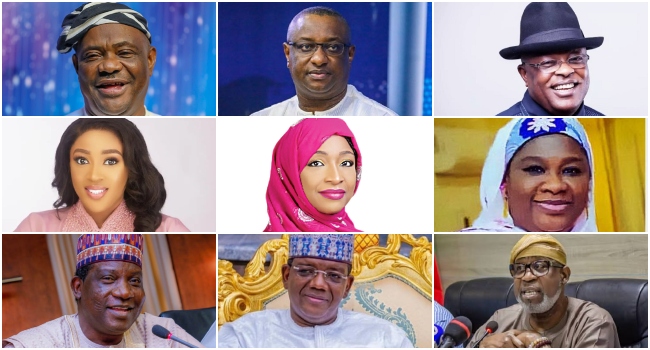THE housing allowances for the newly appointed ministers will cost the country about N343.25m yearly, according to findings from this newspaper
With that annual allocation, in four years, the Federal Government will spend N1.37bn on the 45 ministers-designate’s accommodation.
The allowances are based on data collated from a document obtained from the website of the Revenue Mobilisation and Fiscal Allocation Commission.
It covers allowances for accommodation (200 per cent of basic salary), domestic staff (75 per cent of basic salary), utilities (30 per cent of basic salary), and furniture (300 per cent of basic salary).
Unlike other allowances paid monthly, furniture allowance is usually paid once in four years.
In the list obtained by our correspondent in Abuja, it was noted that the names of a former Governor of Kaduna state, Nasir El-Rufai, a former National Women Leader of the All Progressives Congress, Stella Okotete, and a ministerial nominee from Taraba State, Danladi Abubakar were missing.
Earlier, the Senate had withheld the confirmation of the three owing to security checks.
In the list obtained by our correspondent, it was observed that 13 of the nominees were appointed Ministers of State while some new ministries were also created.
The ministers and their designations are as follows Minister of Communications, Innovation, and Digital Economy: Bosun Tijani; Minister of State, Environment and Ecological Management: Ishak Salako; Minister of Finance and Coordinating Minister of the Economy: Wale Edun; Minister of Marine and Blue Economy: Bunmi Tunji-Ojo; Minister of Power: Adebayo Adelabu; Minister of State, Health and Social Welfare: Tunji Alausa; Minister of Solid Minerals Development: Dele Alake; Minister of Tourism: Lola Ade-John; Minister of Transportation: Adegboyega Oyetola.
Others are Minister of Industry, Trade and Investment, Doris Anite; Minister of Innovation Science and Technology, Uche Nnaji; Minister of State, Labour and Employment, Nkiruka Onyejeocha; Minister of Women Affairs, Uju Kennedy; Minister of Works, David Umahi; Minister of Aviation and Aerospace Development, Festus Keyamo; Minister of Youth, Abubakar Momoh; Minister of Humanitarian Affairs and Poverty Alleviation, Betta Edu; Minister of State, Gas Resources, Ekperikpe Ekpo; Minister of State, Petroleum Resources, Heineken Lokpobiri; Minister of Sports Development, John Enoh and Minister of Federal Capital Territory, Nyesom Wike.
Also on the list are the Minister of Arts, Culture and Creative Economy, Hannatu Musawa; Minister of Defence, Muhammed Badaru; Minister of State Defence, Bello Matawalle; Minister of State, Education, Tanko Sununu; Minister of Housing and Urban Development, Ahmed Dangiwa
Tinubu set the record for the highest number of ministerial nominees in Nigeria’s Fourth Republic (1999 to date) with 48.
The President’s nominees topped the 42 appointed by his predecessor, Muhammadu Buhari, in 2019 by five more persons.
Tinubu first nominated 28 persons to be cleared by the Senate as ministers. The President also sent another list of 19 nominees, making a total of 47 potential cabinet members.
However, Tinubu withdrew the nomination of Maryam Shetty as a ministerial nominee from Kano State and replaced her with Dr Mariya Mahmoud Bunkure, also from Kano State. He also added the name of Festus Keyamo, a Senior Advocate of Nigeria from Delta State, as a nominee for screening.
In his first term, Buhari named 36 ministers, while the number increased to 42 during his second term.
Former President Goodluck Jonathan in 2011 named 33 nominees to be ministers in his cabinet, including nine from the Umar Yar’Adua administration.
In 2007, Yar’Adua named a 39-member cabinet made up of 32 men and seven women.
Former President Olusegun Obasanjo initially named 42 ministers in 1999 but reviewed his cabinet to reduce the number of ministries and ministers to 27 and 40, respectively, before he left office in 2007.
However, with the three yet to be approved, the total number of ministers has dropped to 45, which still exceeds previous administrations.
This newspaper learnt that each minister is entitled to an accommodation allowance of N4.05m, domestic staff allowance of N1.52m, and utilities allowance of N0.61, alongside furniture allowance of N6.08m, which is paid once in four years.
Each minister of state is entitled to an accommodation allowance of N3.92m, domestic staff allowance of N1.47m, and utilities allowance of N0.59, alongside furniture allowance of N5.87m, which is paid once in four years.
An analysis of the figures showed that each minister is expected to get annually a total of N7.7m while each minister of state is expected to get a total of N7.45m annually.
In four years, each minister gets N30.8m while each minister of state gets N29.8m.
In total, the 32 ministers will cost the country about N985.6m while the 13 ministers of state will gulp about N387.4m in four years.
This further means that the 45 ministers will get a total of N1.37bn in four years.








3 Comments
Igabi
Yes
How may we help you?